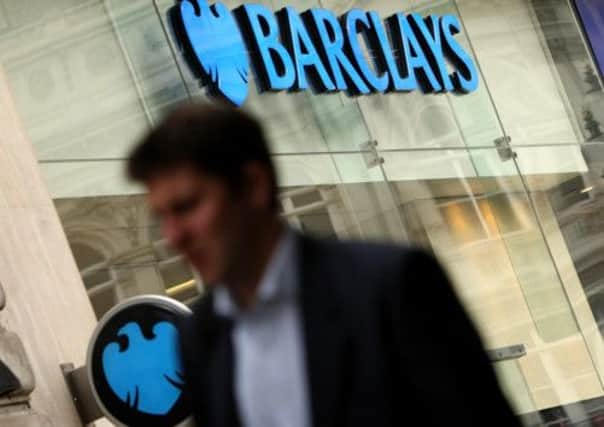Scandal-hit Barclays pays £1m plus to 528 staff


The group’s annual report also showed that chief executive Antony Jenkins was awarded a total pay package worth £2.6 million in 2012, including a £1.5 million long-term incentive bonus due to pay out in future years if he meets performance targets.
Its pay details will stoke controversy after the bank recently reported pre-tax profits plunging to £246 million from £5.9 billion in 2011 following a scandal-hit year which saw it pay £290 million for its Libor rigging settlement and £2.5 billion to cover mis-selling claims.
Advertisement
Hide AdAdvertisement
Hide AdOf the bank’s 139,200 workers, 373 were paid between £1 million and £2.5 million, 50 took home between £2.5 million and £5 million and five earned more than £5 million.
While more than 400 workers picked up more than £1 million, there were more than 71,500 staff who received less than £25,000 last year.
But the number of bankers paid more than £1 million fell from 473 in 2011, with the number of those paid over £2.5 million seeing the greatest fall.
Barclays also said it reduced its 2012 bonus pool by £860 million for Libor rigging and mis-selling, while it clawed back an additional £300 million in previous awards and long-term incentives for the Libor scandal.
Advertisement
Hide AdAdvertisement
Hide AdA potential £3.3 billion bonus pool was also reduced by a further £250 million to better align its pay in the market, although it still shared out a total incentives pot worth £2.2 billion.
This saw employees pick up an average £13,000 in bonuses last year, with investment bankers taking £54,100 on average.
The report also confirmed that former Barclays’ boss Bob Diamond - who quit last summer in the wake of the bank’s Libor-fixing settlement - will continue to be paid salary and pension until July.
He stepped down last summer, but remains entitled to an annual salary of £1.4 million and £675,000 a year cash in lieu of pension.
Advertisement
Hide AdAdvertisement
Hide AdSir John Sunderland, head of Barclays’ remuneration committee, said in the report: “I hope that 2012 will be seen as a turning point in the way Barclays approaches remuneration.”
He added the committee will continue to focus on overhauling pay and bonus practices across the bank over the coming months.
Mr Jenkins, who announced he would waive his annual bonus for 2012 in January, is leading a crusade to overhaul the culture and ethics at Barclays.
As part of his restructure at the bank, he last month announced plans to axe at least 3,700 jobs.
Advertisement
Hide AdAdvertisement
Hide AdHe is shutting the bank’s controversial Structured Capital Markets tax advisory division, with 1,800 jobs being cut in corporate and investment banking and another 1,900 across its European retail and business arm under plans to slash costs by £1.7 billion.
Around 1,600 investment banking jobs have already gone, but few of the overall staff cuts will have an impact on its UK workforce.
Unions slammed Barclays over inequality between the lowest paid workers and the millionaires’ club at the top of the bank.
Dominic Hook, Unite national officer for finance, said: “The rampant inequality in the pay between the top Barclays’ executives and those on the frontline who deal directly with customers is shocking - and needs to be addressed by the chief executive, Antony Jenkins as a matter of urgency.”
Advertisement
Hide AdAdvertisement
Hide AdTUC general secretary Frances O’Grady added: “Barclays is acting as if the financial crisis never happened.
“But ordinary people, who have been made to pay for the folly of bankers, have longer memories and will find the size and scale of these payouts obscene.
“The EU is absolutely right to push ahead with its bonus cap and George Osborne should start siding with the interests of the electorate and the wider economy, rather than the rich and powerful elite in the City.”